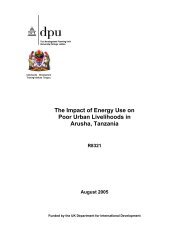EPA Review Annex Documents - DFID
EPA Review Annex Documents - DFID
EPA Review Annex Documents - DFID
You also want an ePaper? Increase the reach of your titles
YUMPU automatically turns print PDFs into web optimized ePapers that Google loves.
Table 9 Annual Cost of Nigeria Trade Office, Geneva (2009)<br />
External trade sector, Geneva (WTO) Amount in Naira Amount in<br />
US$<br />
Expenditure items -<br />
Total personnel cost 110183914.8 787,027.96<br />
Salary & wages - general 0 -<br />
Consolidated salary -<br />
Benefits and allowances – general 110183914.8 787,027.96<br />
Non-regular allowances 110183914.8 787,027.96<br />
Rent subsidy -<br />
Social contribution 0 -<br />
NHIS -<br />
Pension -<br />
Total goods and non - personal services -<br />
general<br />
121415101.7 867,250.73<br />
Total capital project 105000000 750,000.00<br />
Nigeria trade office (WTO)- Geneva, Switzerland 70000000 500,000.00<br />
Purchase of office accommodation 35000000 250,000.00<br />
Total allocation: 336599016.5 2,404,278.69<br />
Source: Federal Government of Nigeria, Budget 2009.<br />
5. Stakeholders Perspectives on <strong>EPA</strong> Negotiations<br />
In this section, stakeholders’ perspectives on <strong>EPA</strong> negotiations are presented. The perspectives<br />
were obtained from the main actors involved in the <strong>EPA</strong> negotiations such as head negotiators,<br />
other officials from National Planning Commission, Nigerian Export Promotion Council, and<br />
external advisers, academics, and civil society. Most of the issues discussed are as follows:<br />
The first reason why Nigeria is engaging in <strong>EPA</strong> despite the availability of other options<br />
is due to the fact that Nigeria is not negotiating as a country but under the ECOWAS<br />
configuration and it is the leader of the other 15 member countries including Mauritania which<br />
depend on Nigeria’s involvement. Essentially, EU prefers to negotiate with the region rather<br />
than with the individual country so even if Nigeria preferred to negotiate separately from the rest<br />
of the region it was not in line with the original Cotonou agreement.<br />
Secondly, it is in the interest of Nigeria to have a strong West Africa. The ECOWAS Free Trade<br />
Agreement (FTA) has not progressed in the way it was initially anticipated. The EU/<strong>EPA</strong><br />
negotiation seems to now be encouraging ECOWAS to start negotiating properly. For the first<br />
time West Africa is negotiating as a region, discussing the need to have a common West African<br />
policy, the most exclusive being the Common External Tariff (CET), without which a strong<br />
ECOWAS and an <strong>EPA</strong> are considered impossible.<br />
Third, Nigeria’s application for GSP+ has twice been rejected by the EU, so Nigeria is without<br />
option but to negotiate <strong>EPA</strong> even though the Cotonou Partnership agreement provides for<br />
alternatives. Similarly, other West African countries are engaging in this <strong>EPA</strong> process with the<br />
134
















